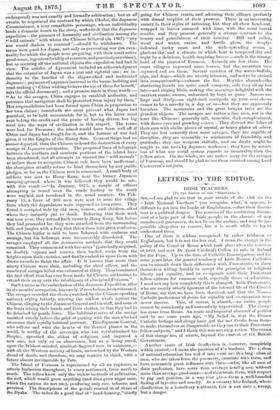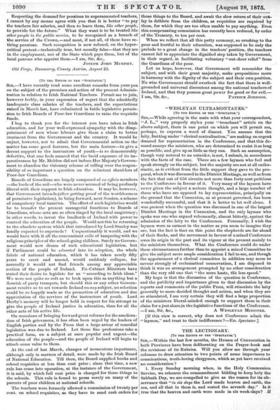IRISH TEACHERS.
ruary 13, a force of 200 men were sent to seize the village Sin,—I am glad to see that in your article of the 14th on the from which the depredators were supposed to have come. They " Irish National Teachers" you recognise what, it appears, is found it occupied only by old men, women, and children, all of difficult to get into the heads of Englishmen,—that their discon- whom they instantly put to death. Believing that their work tent is a political danger. The reasons of the continuing discon- was now over, they turned back towards Hong Kang, but before tent of a large part of the Irish people, in the absence of any they had proceeded far, they were attacked from the surrounding unredressed grievances, do not lie on the surface, and may be lin- hills and jungles with a fury that threw them into great confusion. possible altogether to remove, but it is worth while to try to The Chinese leader is said to have behaved with coolness and understand them.
courage, but his followers were irrecoverably disordered. The One of these is seldom recognised by either Irishmen or savages employed all the destructive methods that they could Englishmen, but it is not the less real. I mean the change in the command. They commenced with fire-arms" (piratically acquired, policy of the Court of Rome which took place after the reaction no doubt), "spears and arrows, then hurled rocks from the of 1849, and sent Dr (now Cardinal) Cullen to rule in Ireland heights upon their enemies, and finally rushed in upon them with for the Pope. lip to the time of Catholic Emancipation, and for drawn swords to finish the affair. It is known that more than some years later, the general tendency of Irish Roman Catholics ninety Chinese were slain, including the chief officer, and the was to smooth down their differences with Protestants, to show number of savages killed was estimated at thirty. Thus terminated themselves willing frankly to accept the principles of religious the first effort that has ever been made by Chinese authorities to liberty and equality, and to co-operate with their Protestant of national education has call, d into exist nee th s large class of men, who are taken from the peasantry, associate with them, and have necessarily great influence with them—who, like all men of their profession, have more than average intelFgaice, without more than average good-sense—and then treats them, with respect to pay and position, in a way that girts them a well-founded feeling of injustice and cruelty. In a country like Ireland, where disaffection is a hereditary sentiment, this is not only a wrong, but a danger.
Respecting the demand for pensions to superannuated teachers, I cannot by any means agree with you that it is better "to pay the teachers fair salaries, and then to leave them, like other people, to provide for the future." What they want is to be treated like other people in the public service, to be recognised as a branch of the service of the Crown,—and most, if not all, of these have re- tiring pensions. Such recognition is now refused, on the hyper- critical pretext—technically true, but morally false—that they are in the employment, not of the State which pays them, but of the local patrons who appoint them.—I am, Sir, &e.,































 Previous page
Previous page